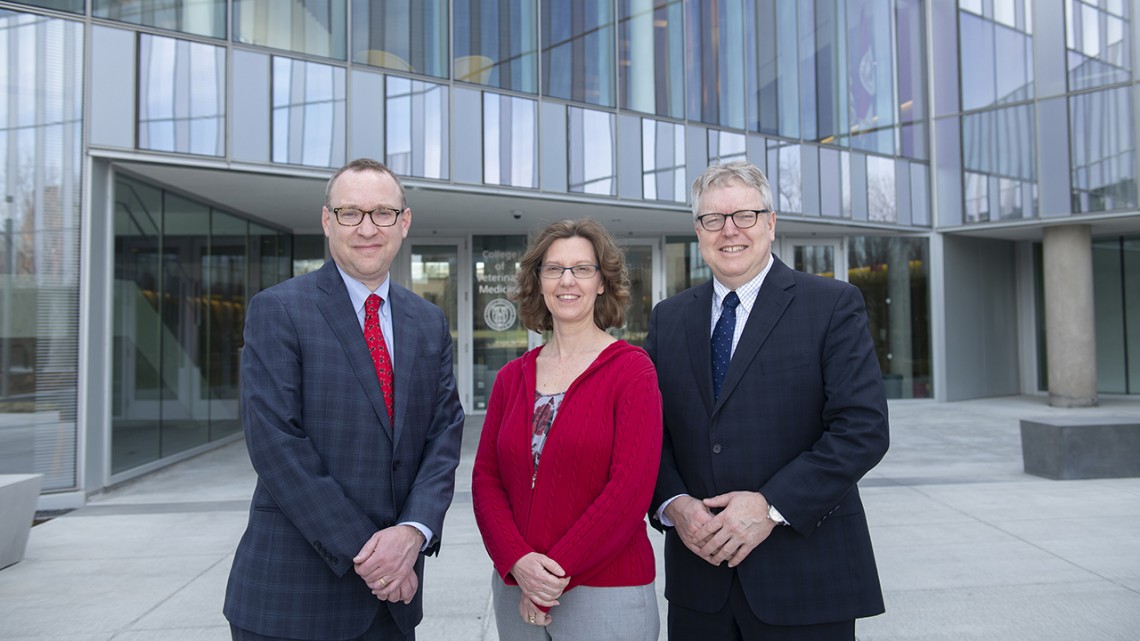
From left, Kevin F. Hallock, dean of the SC Johnson College of Business; Jodi Korich, D.V.M. ’97, associate dean for education at the College of Veterinary Medicine; and Lorin D. Warnick, D.V.M., Ph.D. ’94, the Austin O. Hooey Dean of Veterinary Medicine, outside the College of Veterinary Medicine.
Center for Veterinary Business and Entrepreneurship launches
By Lauren Roberts
What does cash flow and commercialization have to do with caring for cats or cows? The College of Veterinary Medicine (CVM) believes the answer is, quite simply, everything.
CVM has launched the Center for Veterinary Business and Entrepreneurship (CVBE), a new interdisciplinary program intended to spur research, training and outreach in veterinary business to improve animal health care.
Businesses are the vehicle for delivering veterinary medical services and developing new life-saving products, but veterinary academia has largely ignored the business of veterinary medicine as a focus of research and scholarship. The college is taking a new approach with this unique program, which unites expertise from CVM and the Cornell SC Johnson College of Business.
“We’re thrilled to make this announcement,” said Lorin Warnick, D.V.M., Ph.D. ’94, the Austin O. Hooey Dean of Veterinary Medicine. “The center is the culmination of extensive needs-based assessments and planning, and will answer the urgent need in the veterinary profession to provide essential training for students, faculty and alumni to launch, manage and succeed in a business or organization of any kind.”
“We are very pleased to support this new venture with the veterinary college,” said Kevin F. Hallock, dean of the SC Johnson College. “It’s an excellent opportunity to create an interdisciplinary collaboration between our institutions, and to help veterinarians strengthen their businesses and explore entrepreneurism more fully.”
The center focuses on four programmatic pillars: education, economics research, entrepreneurship and intrapreneurship. Through its educational program development efforts, the center will offer a variety of educational programs, including a new D.V.M. certificate program, as well as postgraduate executive education.
The center will establish a veterinary economics research program through a strategic faculty hire and collaborations with Cornell’s Charles H. Dyson School of Applied Economics and Management. Its entrepreneurship program will focus on creating a robust pipeline from scientific discoveries to commercialization; intrapreneurship activities will focus on creating an environment that supports and rewards innovation and improvement.
Leadership search on
The search for two new faculty members to lead the CVBE programming is now underway. One faculty member will spearhead the veterinary business and management curriculum, developing a team-taught program spanning the four-year curriculum that will provide a solid foundation in business management. The second hire will be a tenure-track position in veterinary economics with a joint appointment at Dyson. This new hire will investigate economic strategy and contribute to evidence-based recommendations to improve veterinary health care delivery.
While this search continues, part of this new curriculum is already in motion. Two business courses currently available to veterinary students include Veterinary Practice Management, taught by Robert Karpman, professor of practice at the Dyson School; and Agile Innovation, taught by Wesley Sine, faculty at Samuel Curtis Johnson Graduate School of Management. Agile Innovation is an experiential course that integrates with the Cornell Animal Health Hackathon and teaches students creative problem-solving skills that can be applied to animal health challenges.
As the structure of coursework begins to crystallize, entrepreneurial training and scientific marketization is also taking shape. The CVBE will comprise a novel engine for improving the translation of science into commercialization. Leveraging the entrepreneurial expertise of the SC Johnson College, processes will be developed to help CVM researchers screen their innovations for potential commercialization much more efficiently. Ideas will subsequently be readied for presentation to potential investors or fed to incubators, such as the McGovern Center, for the next step of the startup process.
The launch of the center signifies a new frontier for the college, and one that will define the institution long into the future.
“This is the way veterinary medicine is going,” said Karpman. “I really congratulate the veterinary college. This is the first center of business and entrepreneurship established at any veterinary school in the United States, and they’re taking the lead in this area.”
“It’s exciting to embark on an initiative of this scope,” said Jodi Korich, D.V.M. ’97, associate dean for education. “We are confident that this new center will position our graduates for success in a wide variety of careers, facilitate the transition of biomedical discoveries to commercial products that benefit more animals, harness the power of economics to strengthen animal health businesses and organizations, and provide a platform for veterinary academia to participate in critical conversations about the future of veterinary animal health.”
Lauren Roberts is assistant director of communications at the College of Veterinary Medicine.
Media Contact
Get Cornell news delivered right to your inbox.
Subscribe
